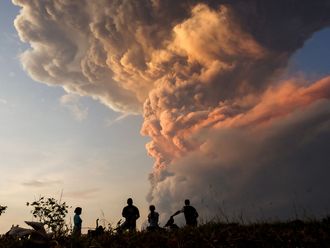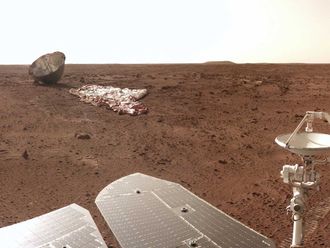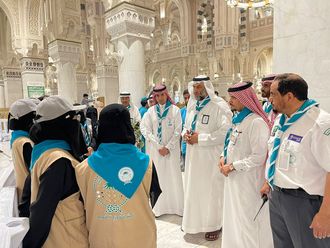Manama: The North Atlantic Treaty Organisation (Nato) summit this week will have a special significance in the context of the war in Afghanistan.
At the summit in Lisbon, world leaders from Nato’s 28-member states are likely to receive Russian support on the anti-terror campaign in Afghanistan.
President Dmitry Medvedev will be the first Russian head of state to attend a Nato summit. Alliance officials hope that Russia will have more involvement in the campaign against terrorism in Afghanistan.
Medvedev's presence will help extend initial US plans at the summit to pressure reluctant and hesitant Nato members to provide more assistance in Afghanistan to include serious negotiations with Russia.
The war in Afghanistan, Nato's first armed conflict outside Europe and the first ground combat operations in its history, will figure high on the agenda of the summit on November 19-20.
Nato currently has 140,000 troops from almost 50 nations in Afghanistan, assigned to the International Security Assistance Force (ISAF).
Alain Deletroz, the European vice president of the International Crisis Group think-tank, told Deutsche Welle that "Russia does not want to be involved in Afghanistan, but does not want to see Nato losing and the Taliban back, with their potential to create troubles in the rest of Central Asia and even in the North Caucasus."
However, according to Russian media, Moscow is ready to cooperate with Nato on the question of missile defence and create a missile defence pool on condition that the security of all nations is taken into consideration.
"This is a more or less hot topic. Nato has proposed cooperation to Russia on this topic," Russian Foreign Minister Sergei Lavrov said last week.
"We have heard clarification about what forms this may proceed in. If we proceed on the basis of equal cooperation, starting with a joint analysis, joint assessment of risks, which exist in the sphere of missile proliferation, then such cooperation is completely feasible," Lavrov said, quoted by Russian news agency RIA Novosti.
He said the Russian President was ready to establish additional proposals which he had already prepared, "on the subject of creating a missile pool of interested states with the participation of Russia, the USA and the European states."
"In Lisbon, President Medvedev will lay out our position on these questions. In the presence of a favorable atmosphere, and readiness for cooperation as equals, and mutual respect taking into account the interests of each other, such a project is possible,” he said.
Lavrov said that the Russia-Nato summit would fix the end of the Post-Cold War Era and will outline strategic partnership tasks.
"We expect that we will be able to state the end of the period of that uncertainty,” he said. "Thus, we will not only draw the line under that period, but we will formulate tasks aimed towards strategic partnership," Lavrov said.
The Russia-Nato summit is also expected to set a record for the number of documents it is expected to endorse.
The main commercial outcome of the meeting in the Portuguese capital will be an agreement between Moscow and Nato on the return transit of military cargoes from Afghanistan via Russia, which promises tens of millions of dollars in monthly budget revenues for the Kremlin, Russia Beyond The Headlines (RBTH) reported.
Another key political document – the common assessment of risks and threats – should take the parties to a level of cooperation that can only exist between allies.
The new agreements will mark a new chapter in the relations between Nato and Russia.
Russian and Nato diplomats are meeting in Brussels for the last round of talks ahead of the summit to put the finishing touches on the key political document: the common assessment of risks and threats.
The 25-page review, described by Russian diplomats as “very dense,” divides the threats into five sections: international terrorism, Afghanistan, piracy, vital infrastructure protection and non-proliferation of weapons of mass destruction, including missile technology.
People familiar with the document said that the drafters of the documents had analyzed all the existing terrorist organizations, assessed the Afghan drug threat, studied methods for protecting cities, chemical and nuclear facilities and discussed “comprehensive ways to combat piracy in Somalia.”
According to the Russian media, Moscow and Nato agreed on all points except the missile threats.
According to sources at the Russian Foreign Ministry, Nato negotiators have adopted the American line on this issue and said they were certain Iran's missiles were a threat. The premise is the major reason both Nato and the United States insist on deploying an anti-ballistic missile defense system in Europe. However, Russia disagrees.
"We do not yet know what decisions will be made in Lisbon,” Russia’s Deputy Foreign Minister Sergei Ryabkov said. “We expect that a decision to start building the system will be made there.”
Russia, he said, is “wondering against whom and what all this is being put in place."
He believes that there is no doubt in Russia that the US and Nato experts are exaggerating this nuclear threat.
Another result of the summit will be a new agreement between Moscow and Nato on military transit of Nato’s military cargoes from Afghanistan via Russia.
A high-ranking Russian Foreign Ministry official said that an agreement on the issue can be considered to have been reached, and the summit will just put a legal stamp on it. “Land transit to Afghanistan is already taking place, and after the summit, transit in the opposite direction will begin, and that would mean an agreement with the Alliance as a whole. Internal state procedures are still yet to be agreed upon, which is being done at present,” the diplomat said, according to RBTH.
Russia’s ambassador to Nato, Dmitry Rogozin, has confirmed that negotiations on return transit were underway.
Moscow thinks it stands to gain commercially from the transit agreement, especially because Nato could start withdrawing international security assistance forces in Afghanistan beginning next year.
"The start of this process will increase transit needs. We are talking about tens of thousands of rail containers every month. The price of carrying one container across Russian territory is $1,800," said a source at the Russian Foreign Ministry.
Russian diplomats do not rule out the possibility that the Lisbon meeting will clarify the so-called helicopter package issue.
According to RTBH, Russia and Nato have been negotiating for over a year a purchase of 21 military Mi-17 helicopters for the Afghan army, but a deal has yet to be signed. The Pentagon then said it would buy the machines for Afghanistan through a tender.
While Nato was urging Moscow to provide three helicopters for free, the United States is going to pay for their delivery. “We had a tentative agreement with Nato, but it has failed to raise the money. Their problem is that of the 28 Nato member countries, only five meet their military budget contribution commitments, so eventually the Americans took it upon themselves to make up for the difference,” said a Russian diplomat who is familiar with the negotiations. “If the deal goes ahead, we may start thinking how Nato can pitch in to service the helicopters.”
Nato to announce a new global vision
Nato’s Global Strategy will guide the world's largest alliance into the coming decades and formalise its role as an international military-security-political force.
According to Nato, the strategic concept outlines Nato’s purpose and nature and the fundamental security tasks of the alliance.
"It also identifies the central features of the new security environment, specifies the elements of the alliance’s approach to security and provides guidelines for the further adaptation of its military forces," the alliance said.











